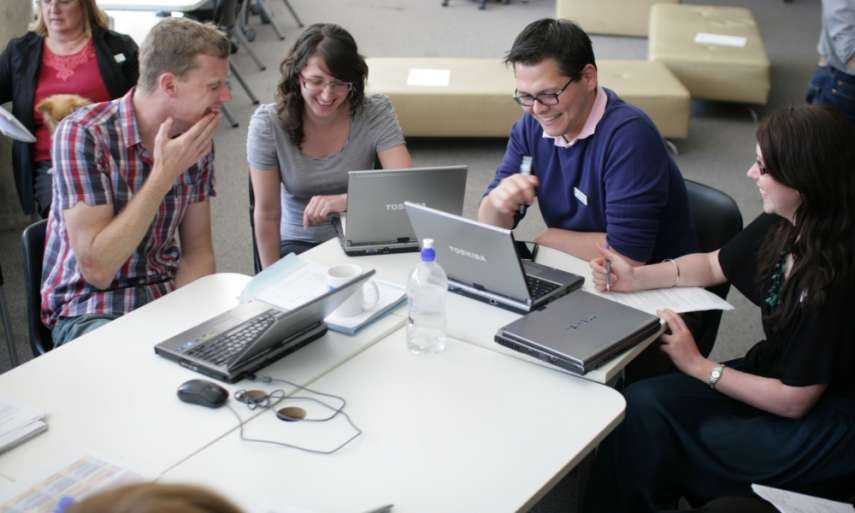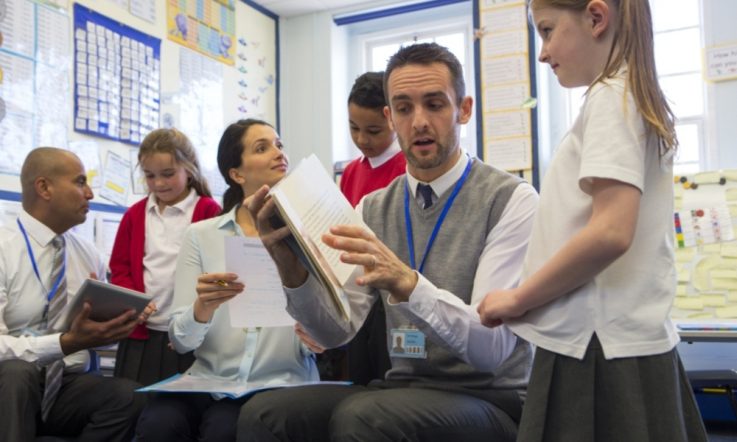The puzzle facing educator Jason Loke was how to make a stronger connection with his senior maths students to improve subject engagement, so he embarked on an action research project to find out if team teaching offered a solution.
'I'd taught Maths Studies for a few years ... [and] always knew there were some students I never really connected with in the classroom,' the Senior Leader, STEM Learning, at Adelaide's Australian Science and Mathematics School, recalls. 'I'd seen them interact with other teachers and felt team teaching could be one way to improve that kind of connection in the classroom.'
The project involved four educators working with Year 10 to 12 students. Loke paired with Chemistry, Maths and Biology teacher, Amanda Watkin, while Andrew Stone and Anne Mignone formed the team teaching group for Chemistry in the first year. Loke and Watkin recently shared their research findings at EPPC (the Excellence in Professional Practice Conference) this term.
Watkin tells Teacher that choosing the right mix of staff for team teaching is important. '[We] found that it works best when perhaps your teaching styles and approaches to students are different, but your values and what you really want out of it are very similar.'
'... For me, the drive was trying to find a teacher that was significantly different in their approach to learning and the structure of learning in the classroom, but also one that I could work with quite comfortably and give and take feedback from,' Loke adds.
The pair studied research on team teaching before deciding on a way forward. 'There is a lot of team teaching research along the idea of planning together but delivering different classes – that's not the approach we decided to take,' Watkin says.
Instead, they combined classes and taught a single cohort together using six models. 'The research that correlates to that [by Karin Goetz, Judie Haynes and Alyssa Zelkowitz] is 'Tag Team Teaching', 'Complimentary or Supportive Team Teaching', 'Monitoring Teacher', 'Station Teaching', 'Parallel Teaching' and 'Alternative Teaching',' Watkin explains.
Loke says every teacher engages in the school's action research program, meaning those taking part in this project already had some research skills. Watkin adds that 'in a truly lovely coincidence' they had both enrolled in a Masters of Education (Cognitive Psychology) and used the research methods taught through that course.
Student feedback was gathered through pre- and post-project surveys (structured using the South Australian Teaching for Effective Learning Framework), focus groups and anecdotal comments. Analysis suggests students’ enjoyment and engagement in Maths has increased as a result of team teaching and academic achievement has been maintained.
'Given that our class sizes were anything between 40 to 53 last year, we haven't had any issues in terms of the overall achievement of the students - there's been no decrease,' Loke comments.
Having two teachers in the same lesson gave students access to multiple explanations for concepts. 'So they really felt that they understood different perspectives on the mathematics ...,' Watkin says. 'They had lots of fun and they were able to access more peers. They felt it was different to their usual classrooms - and we changed up the pedagogies that we used so there was more variety in the learning.'
For Watkin, pairing up with a more experienced teacher was a great learning opportunity. 'The first time we taught Maths Studies together I'd never taught it before, and [Jason] came with huge amounts of resources and knowledge and information on where the students trip up.'
The program is now in its third year and has spread to other subjects, with more than 60 per cent of Year 10 to 12 educators engaged in team teaching and planning.
References
Goetz, K. (2000, August 1). Perspectives on team teaching. Retrieved April 16, 2013, from EGallery: people.ucalgary.ca/~egallery/goetz.html
Haynes, J. (2007). Collaborative Teaching: Are Two Teachers Better Than One? Essential Teacher, 4, (3). Retrieved April 16, 2013 from www.everythingesl.net/inservices/cooperative_teaching_two_teach_83908.php
Leavitt, M. C. (2006) Team Teaching: Benefits and Challenges. Stanford University. Retrieved April 16, 2013, from www.stanford.edu/dept/CTL/Newsletter/teamteaching.pdf
Zelkowitz, A. (2008, December 28). Six Models for Collaborative Team Teaching. Retrieved April 16, 2013, from Strategies for Special Education & Inclusion Classrooms: blogs.scholastic.com/special_ed/2008/12/six-models-for.html
Have you experimented with team teaching in your school?
How did you monitor its success?
What were the outcomes, for students and teachers?



